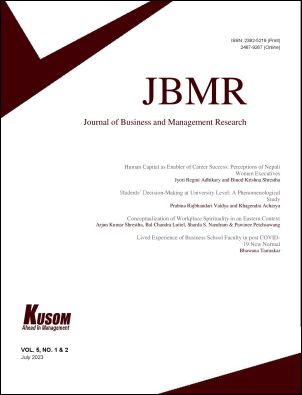Students’ Decision-Making at the University Level: A Phenomenological Study
DOI:
https://doi.org/10.3126/jbmr.v5i1-2.58568Keywords:
Decision making, university students, collectivist society, personal elements, external elementsAbstract
Students’ decision making is a dynamic and complex process. A number of quantitative studies have identified the elements that play their role in this process, particularly in the contexts of the developed regions. However, in the developing countries, especially in the countries of South-Asian region where collectivist societies exist, such studies occur in a very negligible number. To fill this gap, the present study explored the elements that are perceived to affect undergraduate and graduate students’ decision making on academic as well as non-academic contexts. Given that today’s students are tomorrow’s leaders, understanding their decision making may contribute in anticipating the nature of decisions they would make in the future. To understand this phenomenon, interpretive phenomenological analysis was used. The study found two major themes – personal elements, and external elements. The discussion on these themes and their sub-themes highlight that students make decisions centered on consequences such as loss of position and prestige, fear of individual punishments. Students decision making were also found to reiterate the theory of utilitarianism and relative truth theory.
Downloads
Downloads
Published
How to Cite
Issue
Section
License

This work is licensed under a Creative Commons Attribution-NonCommercial-NoDerivatives 4.0 International License.
This license enables reusers to copy and distribute the material in any medium or format in unadapted form only, for noncommercial purposes only, and only so long as attribution is given to the creator.




